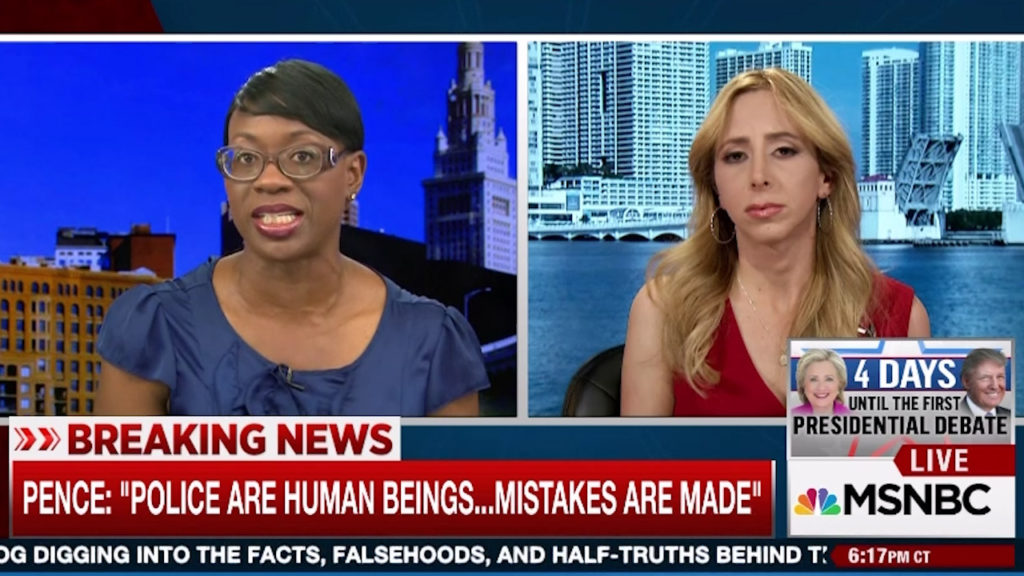Nina Turner is a compelling and passionate voice on MSNBC who attempts to counter a bland definition of prejudice that is systemic throughout our institutions.
Nina Turner schools Trump surrogate and likely many others
Trump surrogate A.J. Delgado got a schooling from Nina Turner when she attempted to discount the existence of institutional racism in police departments. Steve Kornacki played a clip of Trump’s vice presidential candidate Mike Pence. Pence said that both he and Donald Trump believe there is much too much talk about institutional bias or racism within law enforcement. He said police officers are human beings and as such make mistakes.
When the preponderance of errors occur on black and brown bodies, it is necessary to probe institutional racism. Police treat Blacks and people of color with a presumption of criminality. Police unnecessarily force interactions as they did in Charlotte. Keith Scott minded his own business as he waited for his kid to come home from school. There was no reason for the police to even approach him.
A.J. Delgado reiterated Mike Pence’s willfully ignorant statement about stopping the talk about institutional racism in our police departments. Many on the Right and Left are fearful of speaking out frankly about bias in our institutions, especially in police departments. It was refreshing listening to Retired police detective Marq Claxton recently addressing the problem directly. He pointed out it is time to stop lionizing police officers and force the bad ones to face the consequences of their bad acts.
Nina Turner allowed neither A.J Delgado’s nor Mike Pence’s misleading statements to go unanswered.
“Institutional racism exists in this country,” Nina Turner said. “The African American community is not delusional about this. What is happening in Charlotte is not just about Charlotte. It’s about Tulsa. It’s about Cleveland. It’s about Baltimore. It’s about Ferguson. It is about the fact that racism exists in the DNA of America and the only way that we are going to deal with it, is to confess our sins. It didn’t start with policing. It doesn’t end with policing. It is the entire system. And as an African-American mother of an African-American son who is a law enforcement officer, who has been racially profiled throughout his life, who does wear a badge and a gun, who I do worry about on both ends, let me just tell you this. We have to deal with these issues in a very real way. And the African-American community is sick and tired of the same sad song being played over and over and over and over again. And just like novelist James Baldwin and activist James Baldwin said, he said, ‘To be black in America and to be relatively conscious is to be in a rage all of the time.’ And when we have leaders who don’t even want to acknowledge that we have institutional racism in this country, political, economic, financial, we have to admit that and do something about it. And all communities need the police. But we need transparency. We need accountability. We need trust. And they aren’t mutually exclusive. But it is okay for the African-American community to call foul. And that is what we are doing all across this country. We are sick and tired of the same old song being played over and over again. Yet in the wake of all of this, there are dead black men and dead black women in this country. They hold up their hands, they die. They are on the ground, they die. We’ve got to stop it and stop it right now. And I am going to tell you another thing, Steve. We don’t have to wait for presidential candidates. We need governors, and mayors, people in city councils, and state legislators right now to use the power of public policy to change this right now.”
Well said, Nina Turner. It is necessary to dispel many interesting beliefs.
While FBI data frequently gives the impression that blacks are more prone to crime than whites, several factors are ignored. Crime has a socio-economic component. Since more blacks than whites are socio-economically disadvantaged because of history, that reality is reflected in crime rates. Secondly, the institutional bias of law enforcement ensures that policing, arrests, fines, convictions, and incarcerations are more pronounced against blacks. If the input to the data is racist based on law enforcement actions, then the stats will be biased, a poor reflection of reality. This truth is easily corroborated by examining drug convictions. There is much work to be done.

